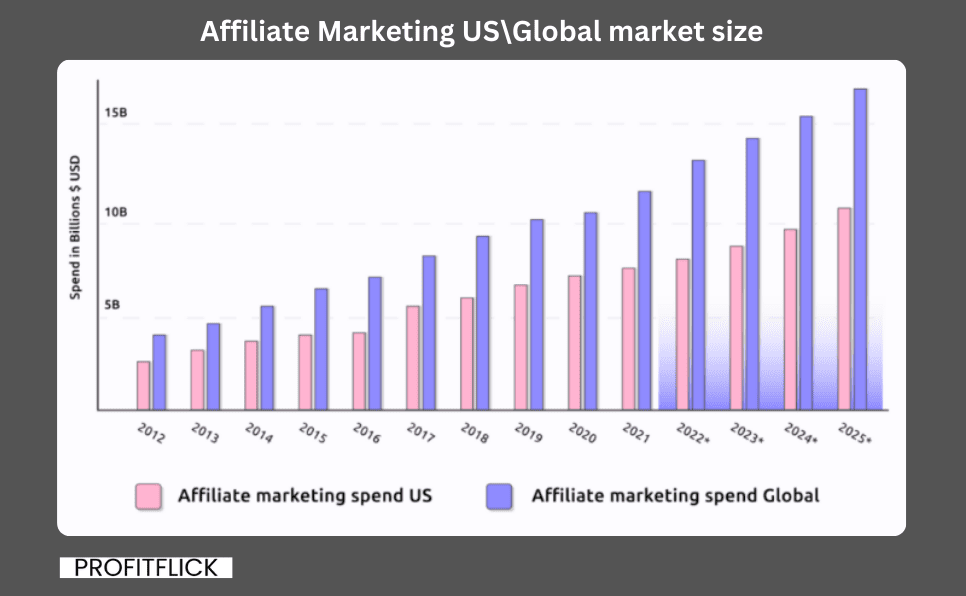What is Affiliate Marketing?
Affiliate marketing is a performance-based marketing strategy where an affiliate, like a YouTuber or a blogger, promotes a company’s products or services to drive sales or customer traffic. In return, these affiliates earn a commission based on the sales or leads generated from their promotional efforts.
According to Forbes, more than 80% of businesses run affiliate programs and are actively looking for the right partners to help promote their brand. Over 15% of affiliate marketers earn over $50,000 per year from their efforts.

How does Affiliate Marketing work?
Key Players:
Affiliate marketing works because of a few key players: affiliate networks, businesses (or merchants), affiliates, and consumers. They all work together to create a system where promotion, partnerships, and earning money happen smoothly.
Types of Commission models in Affiliate Marketing:
Pay-per-click (PPC): Affiliates receive a commission for every click on a link that directs visitors to the merchant’s website.
Pay-per-sale (PPS): Affiliates receive their commission when a successful sale is made through their referral.
Pay-per-lead (PPL): Affiliates are paid for each lead generated, such as a sign-up or an inquiry form submission.
Percentage-based commission: Affiliates receive a percentage of the total sale value for each successful referral.
One-time (fixed) commission: Here, they earn a specific amount per referral, regardless of the sale price.
Top 5 trends in Affiliate Marketing that will turbocharge your business game:
Affiliate marketing is becoming a key strategy, with 83% of marketers leveraging affiliate programs to boost brand visibility.
This is just the beginning, as the affiliate marketing industry is projected to experience a compound annual growth rate of 7.7% from 2023 to 2030.
1.Consumers today are well-informed, but their skepticism is at an all-time high
Traditional advertising has become less effective, more costly, and often intrusive. As a result, many consumers now look to social proof and endorsements from trusted influencers and content creators. This is why affiliate marketing can be so successful. However, ecommerce brands should be cautious when choosing affiliate partners. The right affiliate should resonate with your target audience and align naturally with your brand’s values and identity.
2.AI and other technologies are driving powerful insights
Just like traditional marketing, affiliate campaigns can be monitored, adjusted, and improved over time. AI can also automate the process of evaluating potential affiliate partners. These tools can scan the web to find suitable partners, assessing their past brand associations and activities to ensure they match your brand’s values and objectives.
3.Affiliate Marketing and Influencer Marketing are increasingly overlapping
While these terms are often used interchangeably, they have traditionally been separate strategies.
Historically, influencer marketing has been viewed as a top-of-funnel tactic aimed at building brand awareness and generating interest in new products. In contrast, affiliate marketing has focused on driving conversions, often seen as a bottom-of-funnel strategy that targets audiences ready to make a purchase. Over time, however, these two approaches have begun to merge.
4. Affiliate Marketing models are evolving quickly
While the standard affiliate partners are content creators, influencers, and bloggers, there are growing opportunities to explore other collaborations. You might consider partnering with community leaders, creating co-marketing initiatives with other businesses, or experimenting with strategies that don’t rely on clickable links. The range of affiliate marketing models is expanding rapidly.
You could also explore brand-to-brand collaborations with companies that provide complementary products or services. For instance, a cookware brand might partner with a company offering chef-prepared meal deliveries. Both brands could include promotional cards in their shipments, featuring affiliate links to products from the partner.
5. Saying goodbye to cookies
Affiliate marketers will soon have to adjust to a world without cookies.
As cookies decline, websites are embracing new advertising technologies. Recent studies indicate that 61% of US advertisers are turning to contextual targeting, an alternative method that places ads on pages with content closely aligned to a user’s interests or needs. This shift will encourage more businesses to find ways to reach broader audiences and ensure their ads stay relevant. As cookie usage fades, companies will need to adapt by exploring and implementing new strategies for the future of affiliate marketing.
What are the benefits of Affiliate Marketing?
Before taking a look at the reasons why you should consider Affiliate marketing as your career path, let us go through some real-life examples of successful Affiliate Marketers:
1. Pat Flynn

Pat Flynn is a renowned entrepreneur, author, and blogger who built Smart Passive Income. After being laid off in 2008, he ventured into affiliate marketing and quickly found success. Flynn monetized his website with Google Adsense and made his first $8,000 in November 2008. Over time, his dedication and strategic approach grew his income to over $3 million, making him a prime example of how affiliate marketing can transform financial prospects.
2. Matt Diggity

Another professional who has excelled in this arena is Matt Diggity, who is a prominent figure in affiliate marketing, search engine optimization (SEO), and online business strategy. Through his expertise, he has built several successful companies, collectively generating a monthly revenue of $400,000. His story showcases how leveraging SEO and affiliate marketing can create substantial and scalable income streams, making him an inspiring example for those looking to succeed in the digital marketing space.
Some notable affiliate marketers who have achieved significant success include Darren Rowse, Missy Ward, Jeremy Shoemaker, Rafael Zelik, Kirsty McCubbin, John Chow, and Finch Sells. These individuals highlight the diverse strategies and approaches that can lead to excellence in affiliate marketing.
1.Simple to launch
Starting an affiliate marketing business is straightforward. Here’s how to get going:
Firstly, choose a niche that you want to proceed with. If you have a passion or specific interest, that can be a great choice, or you can go with a topic that you feel comfortable discussing—it’s entirely your call.
Next, select the platform you’ll use for your affiliate marketing efforts. You can create a blog, start a YouTube channel, or build a social media presence, or choose all these three platforms.
Once you’ve picked your platform, set up your website or profile.
Lastly, start creating valuable content that matches your audience’s preferences.
2. Low startup costs
Affiliate marketing requires minimal financial investment. As an affiliate, your role is simply to recommend products, not create them. The only costs involved are typically for setting up your website—though you can use free platforms like WordPress if you prefer. If you’re not familiar with the technical side of website creation, you can hire someone to set it up for a small fee.
The cost-effective nature of affiliate marketing makes it appealing for many people who are looking to start a business.
3. Fulfills an immediate demand
When you’re in the market for a product but unsure which one to choose, your first step is often to search online. That search brings up review sites and product guides, many of which include direct links to the recommended products.
As a consumer, you might click on one of these links to purchase a product that fits your needs. For affiliate marketers, this click is where the commission is earned.
Shopping online often means there’s no in-person guidance, and this is where affiliate marketers play a vital role. With the growing trend of online shopping, the opportunity to earn commissions through affiliate marketing continues to rise.
4. Endless product options
Nearly every product available for purchase has an affiliate marketing program, meaning there’s no shortage of items to promote. Additionally, new products are constantly being introduced to online platforms.
You’ll never run out of products to write about. If you grow tired of focusing on one category, you can easily explore others.
As an affiliate marketer, you’re not locked into promoting just one type of product. You have the freedom to choose what to promote, giving you full control over your offerings. By regularly changing up the products you feature, you can keep your content fresh and avoid creative burnout.
5. Low entry requirements
In traditional jobs, there are often minimum education levels and work experience required, especially in today’s competitive job market.
One of the main advantages of becoming an affiliate marketer is the low barrier to entry. There’s no need for a specific degree or professional background. All you need is a laptop or smartphone to create content and basic skills to manage your website or social media profile.
You won’t even need to go through an interview process. Anyone with the motivation and the right tools can easily step into affiliate marketing.
6. Enjoy complete independence
In a traditional job, you typically report to a boss who monitors your performance and assigns tasks. Even with a supportive boss, the structure of working under someone can feel restrictive.
As an affiliate marketer, you are in charge. You set your own hours, decide what to work on, and choose where to work from. You also have full control over which products you promote and can change them whenever you like.
This level of freedom is rare in most jobs. If you’re wondering why affiliate marketing is a good choice, the ability to be your own boss is a powerful reason.
7. Achieve a better work-life balance
Traditional office jobs often require you to work long hours, including time spent commuting, which can take a toll on your personal life.
The stress and long hours away from home can leave you feeling disconnected from family, leading to tension and burnout.
In affiliate marketing, you control your schedule. You can work from home, set your own hours, and be present with your family while still earning a living. The ability to achieve a healthy work-life balance is one of the greatest perks of being an affiliate marketer.
8. Perfect as a side hustle
Affiliate marketing can be approached in two ways: full-time or part-time. If you’re already in a well-paying job and happy with it, you might want to start affiliate marketing as a side gig to earn extra income.
At the start, you’ll likely spend time learning the ropes and building an audience. Your earnings may not be substantial at first, but having a stable income from your main job can make this process less stressful and more enjoyable.
Once you start earning a steady income from affiliate marketing, you can decide whether to continue part-time, or even transition to full-time if that’s your goal.
9. Build passive income
Most jobs pay you only for the hours you work, meaning you need to be actively present to earn.
With affiliate marketing, you can generate passive income. Once you’ve created content and promoted products, you can continue earning commissions months after the initial effort.
Your website or social media can attract visitors from around the world, meaning you can earn money even while you sleep. There’s a unique satisfaction in waking up to find that you’ve made money overnight.
10. Unlimited earning potential
Affiliate marketing offers unlimited income potential. Since you’re not tied to any one company, you can partner with multiple businesses and promote a wide variety of products.
Even if the commission from each affiliate program is modest, combining several programs can lead to substantial earnings.
With just a stable internet connection and minimal overhead, affiliate marketing gives you the opportunity to earn a generous income. Among the many reasons to become an affiliate marketer, the potential for a significant income is one of the most compelling.
How to start Affiliate Marketing for beginners?
1.Choosing the right Affiliate program

Choosing a suitable affiliate program can be overwhelming due to countless options available.
To determine which program suits you best, start by considering your brand and target audience. Also, check whether the product or service align with their preferences or needs?
Next, examine the details of the affiliate partnership. Pay attention to key factors such as commission rates and cookie duration, as these directly impact your earnings. It’s also essential to read reviews and testimonials from other affiliates to gauge the program’s reliability. Does it have a solid reputation? Does it offer support and provide effective marketing materials? These are crucial questions to answer before you proceed.
2.Mastering the tools of the trade
Affiliate marketing thrives on technology. One of the biggest hurdles is becoming proficient with the various tools at your disposal, from WordPress plugins to graphic design software and even AI-powered tools.
Fortunately, the internet is filled with helpful tutorials and guides. Take advantage of these resources to familiarize yourself with the tools you’ll need. However, the most effective way to learn is through hands-on experience. The more you use these tools, the better you’ll become, so dive in and start practicing!
3.Keeping quality and consistency in brand messaging
Maintaining consistent quality and staying true to a brand’s voice can be challenging. Each merchant will have different guidelines, and balancing their expectations with your own unique style can be tricky. It’s essential to ensure your promotional content aligns with the brand’s messaging while still reflecting your personal voice.
4.Tracking and attribution challenges
Accurate tracking and attribution of sales are crucial for ensuring you receive the right commissions. However, the complex nature of digital marketing, with its multiple channels and touchpoints, can make it hard to determine which actions led to a sale. Tracking discrepancies can lead to frustration, and changes in cookie policies have only added to these challenges.
5.Dealing with competition
Affiliate marketing is more competitive, with numerous affiliates competing for grabbing the attention of similar customer segments.
Instead of seeing competition as a disadvantage, view it as an opportunity to improve. Learn from the successes of top affiliates and aim to replicate their strategies, while also studying the mistakes of those who aren’t as successful. Use this knowledge to avoid common pitfalls and refine your approach.
6.Navigating legal and regulatory compliance
Staying compliant with regulations like the Federal Trade Commission (FTC) guidelines is essential for building trust with your audience. These regulations promote transparency and accountability, but they can also be time-consuming and difficult to keep up with.
7.Growing your audience
To succeed as an affiliate marketer, building a loyal and engaged following is key. You must establish yourself as a trusted authority in your niche, with followers turning to you for product recommendations.
Building a following is one of the toughest challenges in affiliate marketing. To succeed, you must implement two key strategies: finding a niche and creating engaging content.
Identifying a niche allows you to focus on a specific audience or community, whether it’s a particular industry (like tech or fashion) or a geographic area. This enables you to establish yourself as an expert and build a more dedicated following.
Creating high-quality content whether blog posts, videos, or social media posts is equally important. By offering valuable insights, solving problems, or entertaining your audience, you’ll build trust and motivate people to click on your affiliate links.
8.Overcoming market saturation and competition
Affiliate marketing is a competitive field. With so many affiliates promoting similar products, it can be tough to stand out. As the market becomes more saturated, it may become harder to achieve meaningful results. To succeed, you’ll need to use innovative marketing strategies and stay consistent in your efforts.
Affiliate marketing performance can fluctuate. Factors like market trends, consumer preferences, and even seasonality can influence how well your promotions perform. Being flexible and ready to adapt your strategy to changing conditions is crucial for long-term success.
Conclusion
Thus, Affiliate marketing isn’t just about earning commissions it’s about building partnerships that scale your business while offering value to your audience. With the right strategy, anyone can turn passion into profit.

